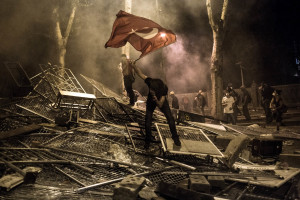
On this “romantic” stage, based on love for the Muslim Brotherhood, he formed a touching alliance with Qatar and even with Riyadh, though the latter is based on a common hatred (in the case of Erdogan, this was a sudden outbreak) of Bashar al-Assad.
Then history came to trip him up. The Muslim Brotherhood, virtually wherever they came into power, in an extremely short period of time – a year to a year and half – had shown themselves as unfit politicians and even worse managers. Everywhere they began to impose strict religious norms, destroy the foundations of secular states and promote their own people, using hard practices far removed from democracy, especially unceremoniously with the secular opposition, and in some places physically cracking down on their opponents. This led to rapid disillusionment of the masses and the political bankruptcy of the ‘brotherhood’, primarily in Egypt, something that was not expected by Erdogan. Furthermore, he was sold short by another close “friend” – Riyadh, which in 2013 launched with the UAE a vigorous campaign against the Muslim Brotherhood, when they realized that the religion of the ‘brotherhood’ was not worth much, compared to their ambitions and electoral technologies of power takeover, being dangerous for the decrepit monarchies themselves. Saudi and Emirati princes quite quickly and efficiently (supposedly, not without Washington’s blessing) removed the Emir of Qatar, who was actively helping “fellow Muslims”, in June 2013, and then helped the Egyptian military to overthrow M. Morsi.
However, the most serious blow to the Turkish leader was made by the “non-overthrowing” of B. Assad. The bet placed on his removal from office was huge, with the entire political capital of T. Erdogan being invested into this. The plan was to win through a blitzkrieg, like in Libya, but it failed. Whereas, the protraction of the conflict began to undermine the stability of Turkey itself – there appeared a problem of the pro-Asad Alevi, who are a powerful minority in the country. Then the Kurdish question rose to full height again, and other problems appeared as well – corruption, democracy, the rise of extremism, the penetration of Salafi militants from Syria, etc. It became dangerous to throw stones in one’s own glass house.
It seems that events of June-December 2013 in Turkey should be taken just from this point of view. Experience shows that it is the unconditional support of the armed opposition in Syria and of the Muslim Brotherhood in general, in the Middle East, which has seriously undermined the credibility of Mr. Erdogan and his policies, both in his country and in Washington. There, it seems, the politicians have lost their illusions about the Muslim Brotherhood as the great democrats (by the way, they might have guessed this before with experience of the Hamas in Gaza). Now, with the help of simple techniques and of a “friend” living in the USA (F. Gulen), the Turkish leader was sent an unequivocal message about the need to change course – otherwise he can get into a dilemma – to either lose power as the Qatari emir, or get himself a “Turkish Spring” – with the same outcome.
Erdogan is an experienced and smart politician. He proved this many times in the course of his entire career, in particular, with finding resources to rectify relations with Russia, undermined by his support of the Chechen separatists. It seems he now understands the signals directed at him, although according to his shouting about the “conspiracy” of Washington, this was very painful to him. The fact that his head is still working well, is proven by the start of political rapprochement between Turkey and Iran (economic ties between them are quite good now – 21.3 billion turnover in 2012), whose impending normalization of relations with the West may allow Erdogan to build a new and very economically and politically profitable regional alliance. The first step – a visit of Foreign Minister Ahmet Davutoglu to Tehran on November 27 last year – has been made. In case of success, Turkey could become a bridge between the Shiite giant, gaining in political weight, and the West. This will allow the two countries to divide influence in the Arab world. However, this requires a small move first – to reconcile with the fact that B. Assad will remain in power and “pull the plug” on Salafi extremists in Syria, to whom the Turkish prime minister provided great assistance during the last two years. The question is – does Erdogan have enough courage and resourcefulness for this, not to appear a renegade to his supporters, and finally not to quarrel with the current leader of the Arab world, Riyadh, which can only see such a scenario in a nightmare?
Pogos Anastasov, analyst, orientalist, exclusively for the online magazine New Eastern Outlook.
